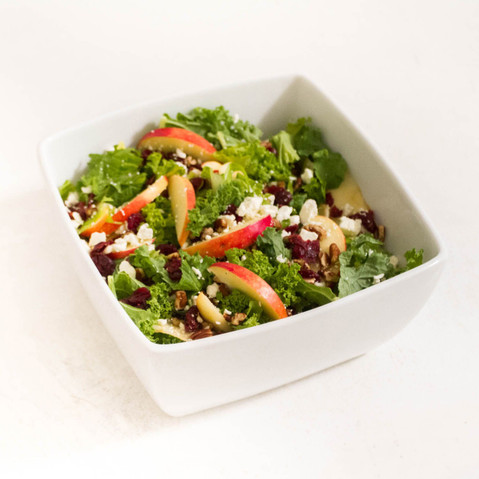9th Dec 2014
Eating Healthy within a Budget
Budgeting, that word that makes us think about the end of the month and reconciling our finances. Budgets can be tricky things to set up and handle, but if used right can really make a difference in our financial, mental, emotional and physical well being. At Kauffman’s we are most interested in delivering healthy goods at an affordable cost, so today is about money and about health in the area of food budgeting.
Apple Pecan and Feta Salad with Honey Apple Dressing
(recipe at the end of post, rated delicious)
Food is a non-negotiable, and because we have to have it, food budgeting it is household skill that is lost by many people in the 21st century. In second and third world nations, just getting enough to live is a problem, but in developed nations, we’re now to the polar opposite; being saddled with 2-3 people being carried around in one body and our budgeting includes a very different line of thinking.
Budgeting food to help slim up
Christmas is coming up, and holidays are a prime example of overeating. I’m not going to touch much on this one, because I just wrote about how to eat wisely through the holidays and it’s an obvious point, as food costs money. If we regularly eat more than we really need or even want we feel worse, our health starts going down the drain, and we have to spend even more money buying new wardrobes to fit our eating habits. One thing affects the next, until just the choice to overeat by a couple of dollars every day affects your income and body weight. This is a powerful negative habit, but even with this one practical tip you can begin to change your life:
Don’t eat or shop on the fly if you can help it. Waiting until the last minute almost always means you will eat more of something that won’t contribute to making your day better or future healthier, i.e Fast food, excessive carbs, sugar and the other obvious of spending more money to buy quick food.
Budgeting food to get healthy
I recently read something by a famous financial expert that surprised me; he said most Americans undercut their food budget and should probably add more too it. “What, that’s strange! You’d think he would have a lot of wise advice about how to spend less on food.” True, except the first thing to understand about saving money is less is more, and in some areas you just can’t skimp quality. Food ties into everything we do, and it’s just not possible to live on pop tarts and maintain a healthy lifestyle.
Old Pennsylvania Dutch Saying: Spend a little more on food now; spend a whole lot less on hospital bills in a few years. It’s worth it to put a little extra money into healthier living now to give us a better future.
Budgeting food to help fatten our wallets
We’d probably all agree that healthy comes first, and part of health is maintaining a good body weight. These two are priorities in what is both a central and fringe benefit: saving money for the future. What we recommend doing is keeping track by making a list of what you use most in a month and can’t do without, like eggs, milk, meat, vegetables, fruits, breads, coffee, flour, etc. Budget out these items and figure what you reasonably spend on this for a month, and then set an amount above that to add in some weekly purchases that don’t keep very long, and specialty items such as ingredients for a special meal or dessert, drinks or holidays. Try to give yourself a little breathing room, even if it does mean cutting out that $4 latte every other day.
One example of wise budgeting is figuring out what you spend on a specialty item like a latte in one year, and then deciding if it is worth it to buy that mid-line espresso machine to make home lattes and drinks. Usually the cost will even out to way less than you would spend at a coffee shop, and you will be drinking half or less of the sugar that goes into the syrupy drinks you buy. There are any number of easy-to-operate machines out there and the fringe benefit is your popularity will up by about 10 points with all your friends.
And to wrap it up...
Winter Salad - Eat Healthy
Apple Pecan and Feta Salad with Honey-Apple dressing
Ingredients:
3 cups kale, de-stemmed, washed and torn
1 apple, sliced thin
2 T. cranberries
2T. pecans
3T. feta cheese, crumbled
For the dressing:
2T. honey
1T. apple cider vinegar
2T. olive oil
½ t. salt and black pepper
Instructions:
Place kale, then apples, cranberries, pecans, and feta cheese on top. If you like, toss them in a bowl first before sprinkling on top of kale.
For the dressing, whisk everything together and pour over salad.
Happy Eating!
Until next time, blessings.

